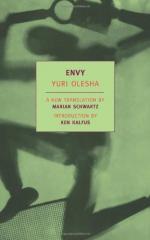|
This section contains 4,760 words (approx. 16 pages at 300 words per page) |

|
SOURCE: Beaujour, Elizabeth Klosty. “Proust-Envy: Fiction and Autobiography in the Works of Iurii Olesha.” Studies in Twentieth Century Literature 1 (1977): 123-34.
In the following essay, Beaujour portrays Olesha's No Day Without a Line as a pessimistic semi-autobiographical work and notes Olesha's attempts to compare himself with Marcel Proust.
The Soviet novelist, Iurii Olesha always said that his talent was essentially autobiographical.1 In his best known declaration, the speech to the First Congress of Soviet Writers in 1934, he stated: “People told me2 that Kavalerov [the hero of his novel Envy] had many of my traits, that it was an autobiographical portrait, that indeed Kavalerov was me. Yes, Kavalerov did look through my eyes. Kavalerov's colors, light, comparisons, metaphors and thoughts about things were mine.”3 To this admission that Kavalerov's sensibility, though not his activity, were Olesha's own, one may add the apparently autobiographical material of the childhood stories: “The Chain...
|
This section contains 4,760 words (approx. 16 pages at 300 words per page) |

|


